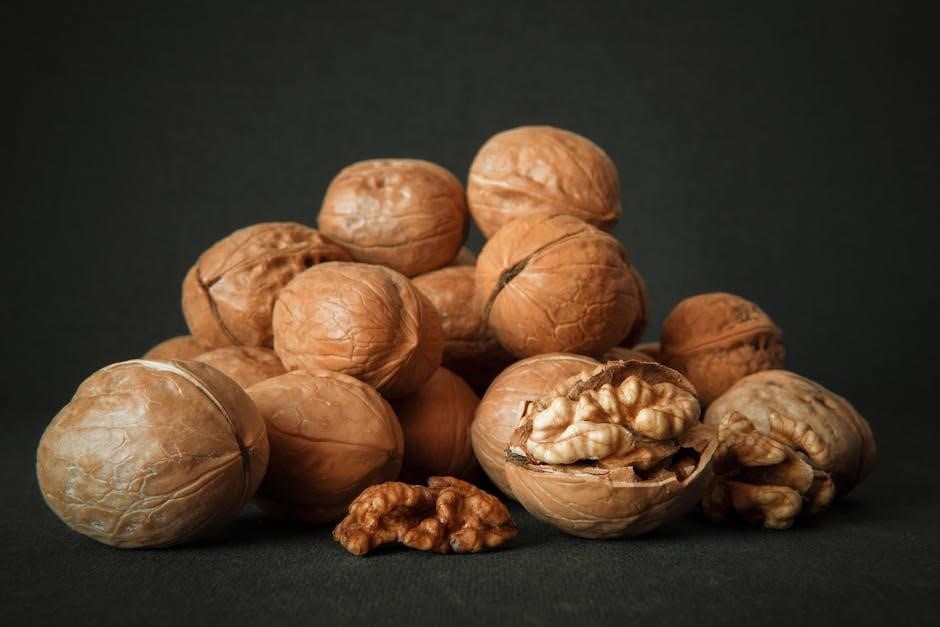
Magnesium-rich foods are essential for maintaining optimal health, supporting muscle function, nerve health, and energy production; Dark leafy greens, nuts, seeds, legumes, and whole grains are top sources. Incorporating these into your diet helps meet the daily recommended intake of 400 mg for adults, promoting overall well-being and preventing deficiencies.

Why Magnesium is Essential for Health
Magnesium is a vital mineral that plays a central role in over 300 bodily functions, including muscle contraction, nerve function, and energy production. It supports bone health, regulates blood pressure, and aids in the metabolism of nutrients. Magnesium also helps maintain healthy blood sugar levels and supports immune function. Deficiencies in magnesium can lead to symptoms like fatigue, muscle cramps, and cardiovascular issues. Incorporating magnesium-rich foods into your diet is crucial for preventing deficiencies and promoting overall well-being. Adequate magnesium intake supports brain health, reduces inflammation, and may lower the risk of chronic diseases such as heart disease and diabetes. Ensuring sufficient magnesium levels is essential for maintaining optimal physical and mental health throughout life.

Top Foods High in Magnesium
Top magnesium-rich foods include dark leafy greens, nuts, seeds, legumes, whole grains, fish, and dairy products, offering a diverse and nutritious way to boost intake.

Dark Leafy Greens: Spinach, Swiss Chard, and Kale
Dark leafy greens are among the richest sources of magnesium, with spinach and Swiss chard leading the way. One cup of cooked spinach provides approximately 154 mg of magnesium, while Swiss chard offers a similar amount. Kale is another excellent option, contributing significantly to your daily magnesium needs. These greens are versatile and can be enjoyed raw in salads, sautéed with garlic, or added to soups. Incorporating them into your meals ensures a steady supply of this essential mineral, supporting bone health, muscle function, and energy production. Magnesium from leafy greens is also easily absorbed by the body, making them a nutritious and effective choice for maintaining optimal health.
Nuts and Seeds as Magnesium Powerhouses
Nuts and seeds are packed with magnesium, offering significant contributions to daily intake. Almonds, pumpkin seeds, and sunflower seeds are excellent choices, supporting bone health and energy production.

Almonds, Pumpkin Seeds, and Sunflower Seeds
Almonds, pumpkin seeds, and sunflower seeds are among the richest sources of magnesium. Almonds provide approximately 80 mg per ounce, while pumpkin seeds offer about 150 mg, and sunflower seeds around 99 mg. These nuts and seeds are versatile, easily incorporated into snacks, smoothies, or as toppings for yogurt and salads. Their high magnesium content supports muscle function, nerve health, and bone strength. Including them in your diet can help meet the recommended daily intake and promote overall well-being. Additionally, they are rich in healthy fats and antioxidants, making them a nutritious addition to a balanced diet.

Legumes: A Rich Source of Magnesium

Legumes are an excellent source of magnesium, supporting muscle function, nerve health, and energy production. They are versatile and easily incorporated into meals for a nutritious boost.
Black Beans, Lentils, and Chickpeas
Black beans, lentils, and chickpeas are among the richest legume sources of magnesium, offering over 100 mg per serving. These versatile foods are not only high in protein but also fiber, making them excellent for digestive health. Lentils are particularly efficient to prepare and can be added to soups or stews, while black beans are a staple in Latin cuisine. Chickpeas, commonly used in hummus, provide a tasty way to boost magnesium intake. Incorporating these into meals ensures a steady supply of this vital mineral, supporting energy production and muscle function. Their versatility and nutritional benefits make them a cornerstone of a magnesium-rich diet.

Whole Grains for Magnesium Intake
Whole grains like quinoa, brown rice, and whole-wheat pasta are excellent sources of magnesium, providing approximately 150-200 mg per serving. They also offer fiber and nutrients.
Quinoa, Brown Rice, and Whole-Wheat Pasta
Quinoa, brown rice, and whole-wheat pasta are excellent whole grains rich in magnesium, offering approximately 150-200 mg per cup of cooked quinoa and about 86 mg in a cup of brown rice. These grains provide sustained energy, fiber, and essential nutrients, making them a nutritious addition to a balanced diet. Quinoa is particularly versatile, serving as a complete protein and a great source of minerals. Brown rice and whole-wheat pasta are also high in dietary fiber, promoting digestive health. Incorporating these whole grains into meals ensures a steady intake of magnesium, supporting muscle function, nerve health, and overall well-being. They are ideal for those aiming to meet the recommended daily magnesium intake of 400 mg for adults.
Fish and Seafood High in Magnesium
Fatty fish like halibut, mackerel, and salmon are excellent sources of magnesium, providing around 150 mg per serving. They support muscle and nerve function effectively.
Halibut, Mackerel, and Salmon
Fatty fish like halibut, mackerel, and salmon are excellent sources of magnesium, with a single serving providing approximately 150 mg. Halibut is particularly rich, supporting bone health and muscle function. Mackerel, known for its high omega-3 content, also contributes significantly to magnesium intake. Salmon, while slightly lower in magnesium than the others, still offers notable benefits. These fish are not only rich in magnesium but also in other essential nutrients, making them a nutritious addition to a balanced diet. Incorporating them regularly can help maintain optimal magnesium levels and support overall well-being.

Dairy Products and Magnesium
Dairy products like milk and yogurt are good sources of magnesium. Milk provides about 27–30 mg per cup, while yogurt offers 30–40 mg per 6 ounces.
Yogurt and Milk
Dairy products, particularly yogurt and milk, are excellent sources of magnesium. A cup of milk provides approximately 27–30 mg of magnesium, while a 6-ounce serving of yogurt offers 30–40 mg. These amounts contribute significantly to the recommended daily intake, supporting muscle function and bone health. Yogurt and milk are versatile and can be easily incorporated into meals, making them ideal for maintaining magnesium levels. They are also rich in calcium and protein, adding extra nutritional value. Including these dairy products in your diet helps ensure adequate magnesium intake and supports overall health. They are especially beneficial for those seeking natural, whole-food sources of this essential mineral.
Other Magnesium-Rich Foods
Soybeans, tofu, and dark chocolate are rich in magnesium. Soybeans provide about 150 mg per 100g, while dark chocolate offers 170 mg per ounce. These foods add variety and nutrition to a balanced magnesium-rich diet.
Soybeans, Tofu, and Dark Chocolate

Soybeans and tofu are excellent plant-based sources of magnesium, with soybeans providing approximately 150 mg per 100g, while tofu offers around 80 mg per 100g. Dark chocolate, particularly those with high cocoa content (70% or more), is another rich source, offering up to 170 mg of magnesium per ounce. These foods are versatile and can easily be incorporated into meals, offering not only magnesium but also protein, fiber, and antioxidants, making them great additions to a balanced diet aimed at meeting daily magnesium requirements.